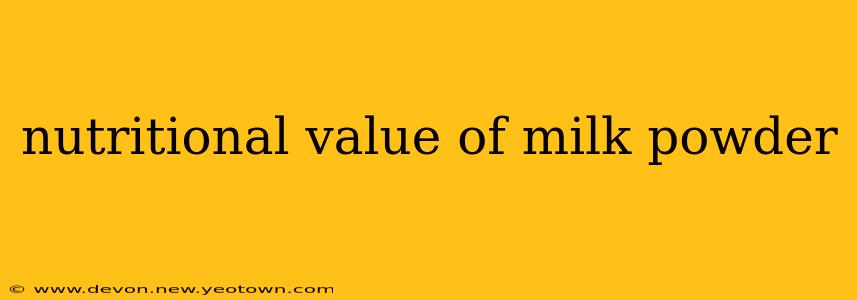Milk powder, that seemingly humble staple in pantries worldwide, holds a nutritional powerhouse within its fine granules. Far from being a mere substitute for fresh milk, milk powder offers a convenient and surprisingly versatile source of essential nutrients, making it a valuable addition to diets across the globe. But what exactly makes it so nutritious? Let's embark on a journey to uncover the secrets within this concentrated dairy delight.
What are the key nutrients found in milk powder?
Milk powder, whether it's skimmed, whole, or a specialized blend, is a concentrated source of vital nutrients. At its core, it retains many of the beneficial components present in fresh milk, albeit in a more concentrated form. Key nutrients include:
-
Protein: Milk powder is an excellent source of high-quality protein, providing essential amino acids crucial for building and repairing tissues, supporting immune function, and maintaining overall health. The protein content varies depending on the type of milk powder; skimmed milk powder generally contains a higher percentage of protein compared to whole milk powder.
-
Calcium: A cornerstone of strong bones and teeth, calcium is abundant in milk powder. Adequate calcium intake throughout life is essential for preventing osteoporosis and maintaining skeletal health.
-
Vitamin D: Often fortified, milk powder is a great source of Vitamin D, vital for calcium absorption and bone health. Vitamin D also plays a role in immune function and overall well-being.
-
Riboflavin (Vitamin B2): Crucial for energy production and healthy skin, riboflavin is another nutrient generously provided by milk powder.
-
Other Vitamins and Minerals: Milk powder also contains various other vitamins and minerals, including vitamin A, vitamin B12, phosphorus, potassium, and zinc, contributing to overall health and well-being.
Is milk powder as nutritious as fresh milk?
This is a common question, and the answer isn't a simple yes or no. While milk powder retains much of the nutritional value of fresh milk, there can be some subtle differences. The processing involved in creating milk powder can lead to slight reductions in certain vitamins and the bioavailability of some nutrients might be slightly lower. However, modern processing techniques minimize these differences, and fortified milk powders often compensate for any potential losses. Ultimately, milk powder remains a remarkably nutritious option, especially when considering its convenience and long shelf life.
What are the benefits of consuming milk powder?
Beyond its impressive nutritional profile, milk powder boasts several practical advantages:
-
Convenience and Shelf Stability: Milk powder's extended shelf life makes it ideal for storage and use in situations where refrigeration isn't readily available. This makes it a valuable asset for emergency preparedness, backpacking, or simply for maintaining a readily-available supply of essential nutrients.
-
Versatility in Cooking and Baking: Milk powder's ability to be easily reconstituted makes it a convenient ingredient in a wide range of recipes, from smoothies and sauces to baking applications. Its concentrated nature adds richness and creaminess to various dishes.
-
Cost-Effective: In many regions, milk powder can be a more cost-effective option than fresh milk, especially considering its longer shelf life and reduced spoilage.
What are the potential drawbacks of milk powder?
While generally safe and nutritious, milk powder does have a few potential downsides:
-
Lactose Intolerance: Individuals with lactose intolerance may experience digestive discomfort when consuming milk powder unless they opt for lactose-free varieties.
-
High Sodium Content: Some milk powders can be relatively high in sodium, which may be a concern for individuals on sodium-restricted diets. Checking the nutritional label is crucial for those watching their sodium intake.
-
Potential for Allergic Reactions: Milk allergies are a concern for a segment of the population. Individuals with known milk allergies should strictly avoid milk powder.
How much milk powder should I consume daily?
The recommended daily intake of milk powder depends on individual factors such as age, activity level, and overall dietary needs. Consult a healthcare professional or registered dietitian to determine the appropriate amount for your specific circumstances. Relying on the nutritional information provided on the packaging is essential for monitoring your intake of various nutrients.
In conclusion, milk powder offers a convenient and nutritious way to incorporate essential vitamins, minerals, and protein into your diet. While fresh milk remains the ideal choice for some, milk powder stands as a valuable and versatile alternative with numerous benefits for health and convenience. Always remember to choose reputable brands and read labels carefully to make informed choices about your nutritional intake.

